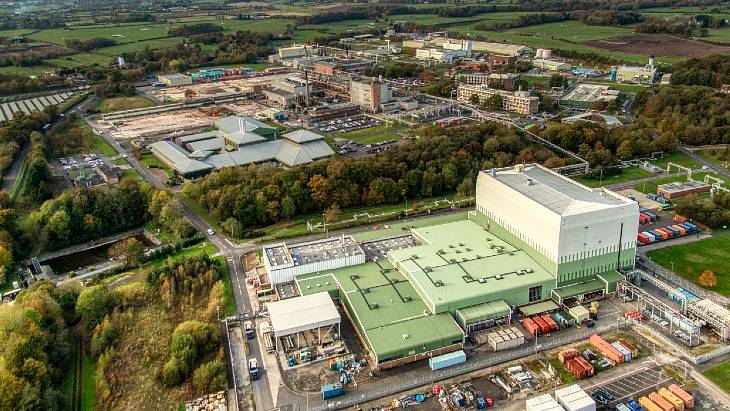The UK government has begun accepting bids for up to GBP50 million (USD60 million) funding for projects it hopes will "stimulate a diverse and resilient nuclear fuel market" in the country.

An aerial view of the Springfields site (Image: Westinghouse)
The Nuclear Fuel Fund is intended to provide greater options for UK nuclear operators to use UK-produced fuel, as the country seeks to diversify its uranium and nuclear fuel production capacity away from Russia.
The GBP50 million fund is also intended to "support projects establishing new domestic fuel capabilities, which could include fuel supply options for Light Water Reactors, including future Small Modular Reactors, that could support much of our current nuclear energy needs. It will also look to support projects producing new fuel types which will be needed to supply advanced modular reactors, likely to be in operation from the 2030s, such as high assay low enriched uranium".
Last month, GBP13 million was allocated to Westinghouse to help "prepare the necessary design and enabling work to begin new conversion capabilities for the world's utilities from 2028" at the Springfields site in Lancashire. The idea is that the facility would provide both reprocessed and naturally occurring uranium conversion services to utilities around the world.
To mark the opening of bids for the fund, UK energy and climate minister Graham Stuart said that Russia's war with Ukraine has "highlighted the need for more home-grown renewable energy, but also UK-generated nuclear power - building more plants, and developing domestic fuel capability. This investment package will strengthen the UK’s energy security by ensuring access to a safe and secure supply of UK-produced fuel to power the UK nuclear fleet of today and tomorrow - squeezing out Russian influence, while creating more UK jobs and export opportunities."
Tom Greatrex, CEO of the UK's Nuclear Industry Association, said: "Having the sovereign capability to manufacture next generation nuclear fuels for advanced reactors of the future is vital for energy security and net zero. It will also open up export opportunities for the UK, helping us reclaim our place as world leaders in the fuels sector."
The guidance for applicants to the fund, which closes to bids on 20 February, says it will offer "match funding to promising projects which support the preservation and development of UK fuel production capabilities".
It explains that "nearly all the UK’s historic and existing nuclear reactors have been fuelled using a UK-led supply chain for uranium enrichment and fuel fabrication". But, it adds, this had been based on gas-cooled reactors, and "the future UK fleet is expected to be made up of a variety of reactor technologies spanning other types of Gigawatt reactors, Small Modular Reactors and Advanced Modular Reactors, many of which require new and advanced fuel types. It is therefore likely that in future the UK supply chain will need to meet demand for a range of different fuel types: for reactors which are currently deployed or in construction in the UK or internationally, and for advanced reactors which are not currently operational but first-of-a-kind projects and first fleets are likely to deploy in the near future (~15 years)."
Following consultation with the industry, barriers to investment in the UK nuclear fuel sector were identified, including: the high upfront costs of establishing new facilities and product lines; uncertainties regarding the long-term makeup of future fuel demand, particularly with regard to the emergence of advanced reactor technologies; costs and timelines associated with siting and licencing of new nuclear fuel facilities and products and a shortage of nuclear and engineering skills.
The specific priorities for the Nuclear Fuel Fund are identified as:
Light water reactor fuel supply
High-assay low-enriched uranium supply chain
Advanced modular reactor fuel fabrication capabilities
Enabling UK fuel production capabilities.
Researched and written by World Nuclear News